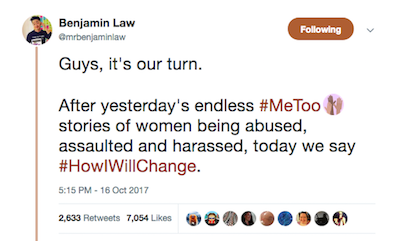Twitter Users Spreading Sexual Violence Prevention Strategies.
 In the wake of #MeToo, the hashtag #HowIWillChange asked men to come forward on Twitter to discuss ways in which they would change their own behavior to prevent sexual violence and mitigate harm for victims.
In the wake of #MeToo, the hashtag #HowIWillChange asked men to come forward on Twitter to discuss ways in which they would change their own behavior to prevent sexual violence and mitigate harm for victims.
“#HowIWillChange: Acknowledge that if all women I know have been sexually harassed, abused or assaulted, then I know perpetrators. Or am one,” tweeted Australian journalist Benjamin Law, who started the hashtag since used by thousands of other Twitter users.
But how helpful has the hashtag actually been? According to a new study by School of Public Health researchers, Twitter users have proposed many potentially effective sexual violence prevention strategies, although there are also gaps in the strategies being discussed, and even some misinformation and myths being perpetuated.
The study was published in the Journal of Interpersonal Violence.
“Right now, this is how people are engaging in sexual violence prevention, through these online movements,” says lead author Alyssa Harlow, a doctoral student in the Department of Epidemiology. “We can learn a lot by analyzing how people interact with these hashtags. It can be very revealing, and can help us see where there may be opportunities for more targeted interventions.”
Harlow and her colleagues used a sample of 1 percent of all tweets with the hashtag #HowIWillChange, then eliminated all retweets, non-English language tweets, spam tweets, and tweets that included pictures, video, or links to news articles. They also eliminated tweets that did not mention specific actions. They then analyzed the remaining 1,493 tweets.
They found that 52.7 percent of the tweets discussed proactive prevention strategies, including teaching children about respect and relationships, changing language related to sexual violence, and introspection and self-accountability. The researchers noted that tweets about teaching children proposed distinct lessons for boys and girls, usually framing boys as needing lessons on their own behavior, while framing girls as needing lessons on self-worth and how to stand up for or defend themselves—but not on consent, even though sexual violence prevention experts consider consent to be something children of all genders should be taught, the authors wrote.
The researchers also found that 34.2 percent of the tweets discussed reactive prevention strategies, including challenging jokes or misogynic and sexist statements, reporting sexual violence perpetrators, and mitigating harm after an assault. The tweets about challenging jokes and statements were often specific and actionable, with men stressing the importance of doing so despite potential awkwardness or even needing to confront a superior at work. Many tweets proposed concrete steps, including reporting perpetrators and expressing belief in victims and helping them access specific resources. Some Twitter users proposed directly confronting perpetrators rather than cutting them out of their lives, and one Twitter user suggested that those who have committed harassment in the past should use their own experiences to educate other perpetrators.
However, while many Twitter users discussed confronting peers about harassment, most scenarios involving assault and rape were vaguer, suggesting that these Twitter users did not believe their peers engage in this behavior or realize that most sexual assault and rape is committed by acquaintances and partners of victims, the authors wrote. “Our results suggest that although well meaning, the Twitter discourse generated by #HowIWillChange may perpetuate this ‘stranger rape’ fallacy.”
The researchers also found that 22.4 percent of the tweets expressed negative sentiments about the hashtag, including denying responsibility, expressing doubt or blame toward victims, and claiming that rape culture is a myth.
“As sexual violence continues to gain more attention in the media and on social media, we may see more public pushback against sexual violence prevention,” Harlow says. “It’s frustrating, but it’s important to understand if we want to make change and develop effective public health programs.”
The authors concluded that sexual violence experts should take advantage of current heightened social media attention and use hashtags such as #HowIWillChange to inform their work and to disseminate information.
The study was co-authored by doctoral students Sydney Willis and Meghan Smith, and by Emily Rothman, professor of community health sciences.